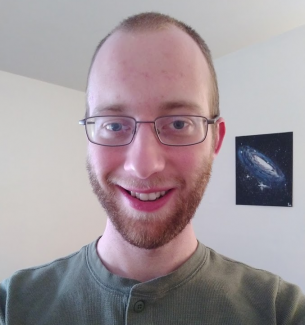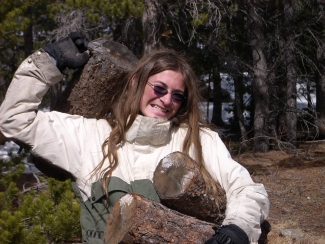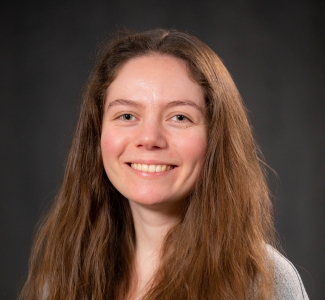This year was the first year the CU physics department awarded graduate students for “ TA Excellence” and "Outstanding Graduate Student Service.” Recipients of these awards were nominated by physics faculty and staff and recognize students who made outstanding contributions to the Physics Department. Each award came with a certificate and a $100 prize.
Three JILA graduate students have been recognized this semester.
Tyler McMaken
Tyler McMaken won the CU Physics award for “ TA Excellence.” Tyler McMaken is a current third-year Ph.D. student from Ohio researching theoretical astrophysics with JILA Fellow Andrew Hamilton. His studies focus on the inside of black holes, where he works on both visualization and fundamental research on how general relativity and quantum field theory combine in one of the most extreme parts of the Universe. Tyler also has a passion for teaching, stemming from his past work as an educator at a science museum for almost a decade. At CU, after a year of being a general physics TA, Tyler became a co-instructor for CU-Prime's class on the Fundamentals of Scientific Inquiry. He has also taught Physics of Sound and Music for the past two summers, where he developed a new set of home labs and virtual assignments for the course during the COVID-19 pandemic, and this spring he is currently the instructor for Physics of Light and Color.
Ran Brynn Reiff
Ran Brynn Reiff won the CU Physics award for “Outstanding Graduate Student Service.” He received this award for his work with CU Prime and R-Cubed. Brynn works in the Ultrafast AMO Theory Group with Andreas Becker and Agnieszka Jaron-Becker, studying high-harmonic generation through numerical simulations, with a focus on radiation near the ionization threshold and efficient extensions to larger atoms and gas jets. Brynn also works on diversity workshops and logistics and is involved with JEDI.
Julia Cline
Julia Cline received the CU Physics Award for "Outstanding Graduate Student Service" (In recognition of outstanding contributions to R^3 and Graduate Program Revision). Her current work focuses on creating a conveyor belt system that continuously guides, cools, and loads strontium atoms into an optical ring cavity. This work is a key milestone towards the first demonstration of continuous-wave superradiance from an ultra-narrow optical transition, which has the potential to be a high-precision, accurate optical frequency reference. Julia's publications can be found here: https://arxiv.org/search/?searchtype=author&query=Julia+R+K+Cline.
Julia works towards improving representation, recruitment, and retention in the Physics Department. Recently, she co-authored a proposal to create a more equitable graduate admissions process at CU and co-created the new CU Physics Diversity, Equity, and Inclusion page. Additionally, Julia is a peer mentor, one of the leaders of the Women and Gender Minorities in Physics group, and has served on the CU Physics Graduate Admissions Committee.





 The Physics Frontiers Centers (PFC) program supports university-based centers and institutes where the collective efforts of a larger group of individuals can enable transformational advances in the most promising research areas. The program is designed to foster major breakthroughs at the intellectual frontiers of physics by providing needed resources such as combinations of talents, skills, disciplines, and/or specialized infrastructure, not usually available to individual investigators or small groups, in an environment in which the collective efforts of the larger group can be shown to be seminal to promoting significant progress in the science and the education of students. PFCs also include creative, substantive activities aimed at enhancing education, broadening participation of traditionally underrepresented groups, and outreach to the scientific community and general public.
The Physics Frontiers Centers (PFC) program supports university-based centers and institutes where the collective efforts of a larger group of individuals can enable transformational advances in the most promising research areas. The program is designed to foster major breakthroughs at the intellectual frontiers of physics by providing needed resources such as combinations of talents, skills, disciplines, and/or specialized infrastructure, not usually available to individual investigators or small groups, in an environment in which the collective efforts of the larger group can be shown to be seminal to promoting significant progress in the science and the education of students. PFCs also include creative, substantive activities aimed at enhancing education, broadening participation of traditionally underrepresented groups, and outreach to the scientific community and general public.